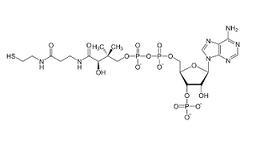A cofactor is a factor that, when joined with another or others, favors the development of something. It should be remembered that a factor is an element whose action is carried out in conjunction with others.
 In the specific field of biochemistry , the molecule that is essential for the functioning of an enzyme is called a cofactor. These are thermostable components that have a low molecular mass and are not proteinaceous.
In the specific field of biochemistry , the molecule that is essential for the functioning of an enzyme is called a cofactor. These are thermostable components that have a low molecular mass and are not proteinaceous.
By binding to a protein structure known as an apoenzyme , the cofactor allows the creation of a complex called a holoenzyme .
In addition to all the above, we cannot ignore that the cofactors are basically of two types:
-Metal ions, which can carry out three different functions. On the one hand, they can act as a bridging group, which means that they give rise to what is known as the coordination complex since they bring together both the enzyme and the substrate. Secondly, they can act as a primary catalytic center. And, thirdly, they can function as a stabilizing agent for the conformation of the enzymatic protein. This protein, yes, will be presented in its catalytically active form.
-Organic molecules. They also respond to the name of coenzymes and are usually vitamins. Specifically, we can establish that some of the most relevant coenzymes are FADH2, NADH or NADPH.
Of the aforementioned enzymes, which are a special type of protein, a series of aspects of interest can be highlighted, such as these:
-They are specific, that is, they can discriminate molecules to achieve greater efficiency in the chemical transformations that take place.
-Some are found in the cytosol, others in the organelles and there are also those located in the plasma membranes, for example.
-They can be active as long as a series of conditions occur, such as temperature or PH.
-Among the most relevant are hydrolytics, oxygenases, oxidoreductases, phosphatases and polymerases.
When a cofactor is an organic molecule that is part of an enzyme, it is called a coenzyme . These cofactors, which are usually vitamins, act in the reactions catalyzed by enzymes.
Metal ions, as cofactors, are involved in different processes as bridging groups, primary catalytic centers or stabilizing agents. A metalloenzyme is an enzyme that requires a metal ion as a cofactor for its operation.
It can be said that cofactors complement enzymes. In each enzyme the cofactor must appear in the precise amount to allow it to catalyze a biochemical reaction. It should be noted that catalyzing refers to an increase in the speed of the reaction without altering the final result. Enzymes that are complemented by cofactors are considered biochemical catalysts .
It is also important to mention that, while enzymes are not modified in the chemical reaction, coenzymes (cofactors) do undergo changes in the process, accepting or giving up electrons .
